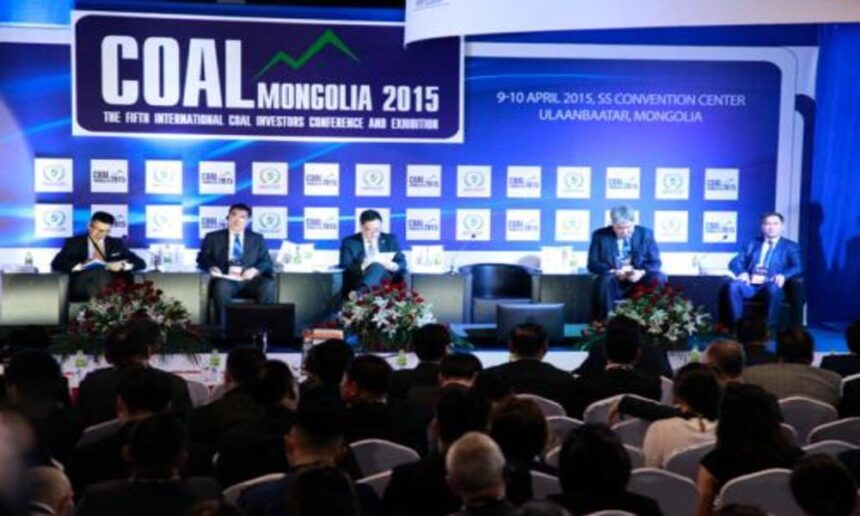The annual Coal Mongolia conference took place in Ulaanbaatar on May 9-10, 2015. Although the conference was not as large as the ones in previous years and did not have as many participants, the general ambiance of the conference expressed the reality and outlook of Mongolia’s coal sector as accurately as possible.
During the conference, both Mongolians and foreign investors already had an expectation that the Government of Mongolia would begin a great change in Mongolia’s coal industry by extracting Tavan Tolgoi’s coal and signing a multilateral agreement to build a railroad to the southern border.
The President of Mongolia has made his thoughts clear by saying that the TavanTolgoi agreement can be handled by the government and does not need to be discussed by the parliament. Four days prior to that, the Prime Minister had officially announced that the negotiations of Tavan Tolgoi project were in the final stage and the government would immediately conclude the agreement.
However, when the Speaker of Parliament opened the spring session the following morning, he announced, “I will not allow an agreement with grave consequences to be established. The negotiations will be signed off on by the parliament. The ministers who are trying to sign the agreement without approval from the parliament will be held accountable.”
This statement caused the departure of the representatives who had come to Mongolia to sign the Tavan Tolgoi agreement. Also, a representative from the Chinese embassy ended up not taking part in the Coal Mongolia conference despite having already registered.
Why did the aspiration of Mongolians to become Saudi Arabia by using our coal end up in a desperate state? What do the events around Tavan Tolgoi tell us?
USING OUR COAL
Most Mongolians currently believe that the foremost driver of economic growth is making use of our coal, especially the high calorie coal in TavanTolgoi. In 2014, one fourth of Mongolia’s budget revenue and 17 percent of export revenue came from coal. Today, everyone acknowledges that coal leaves bright marks despite its dark looks.
R.Jigjid, the Minister of Mining, stated in the conference that Mongolia has coal reserves of 173.5 billion tons, 31.7 billion of which are proven reserves, and probable reserves of 5-10 trillion cubic meters of coalbed methane.
The government, the private sector, and the public think that Mongolia can become competitive when we are able to wash, refine, and process the coal to deliver to clients at low costs.
The minerals law was amended to allow resuming the issuance of mining exploration licenses.
The supply and demand for this commodity are quite stable on international market today.
The coal imports in our region are expected to rise by two percent this year to reach 621 million tons, half of which will be equally divided to India and Japan, 37 percent to China, and the rest to South Korea. Although China’s economy grew by seven percent, their use of coal has become quite stable. On one hand, it is a result of air pollution. On the other hand, reform in steel production technology plays a role.
Some work has been done since Coal Mongolia 2014 to make the legal environment in the mining industry more stable, clear, and more competitive in the long term. It includes the approval of the state minerals policy and the decisions to add more value to coal, build a power plant, begin the deep processing of coal, and producing petroleum products.
The minerals law was amended to allow resuming the issuance of mining exploration licenses. Furthermore, the petroleum law was revised to regulate some issues related to agreements and exploration of coalbed methane and shale.
Furthermore, there were amendments to the law on waiving VAT and customs tax. Any piece of equipment imported to Mongolia in the framework of projects to produce petroleum products from shale and coal is free of VAT and customs tax until 2018.
The standardization and categorization of coal and coal products has been revised. As a result, coal now has three categories (anthracite, bituminous/rock, and lignite/brown) and 17 groups.
STALEMATE OF MEGA PROJECTS
It has become impossible to imagine Mongolia’s socio-economic development in the next 20 years without the OyuTolgoi copper deposit and TavanTolgoi coal deposit. Domestic and foreign investment and the total amount of debt depend on whether or not Mongolians make smart decisions around these two deposits.
The ongoing stalemate of these two projects reduces the time and opportunity for Mongolia to develop and affects our reputation while the projects gradually lose their market value. However, recent events show that the government is no longer capable of making a swift decision on TavanTolgoi. Let us review the reason why the decisions related to mega projects are not being made.
1. The Democratic Party, which is leading Mongolia’s coalition government, has enormous conflicts internally and has weak capabilities to govern. The Democratic Party has all the power and authority. However, they cannot communicate with each other and make a unanimous decision. It is not democracy, but anarchy.
2. Behind these anarchist actions, there are significant differences between personal interests, opinions, and understandings of governance. The recent events show us that the conflict between factions within the Democratic Party has become critically large.
2015.04.15












